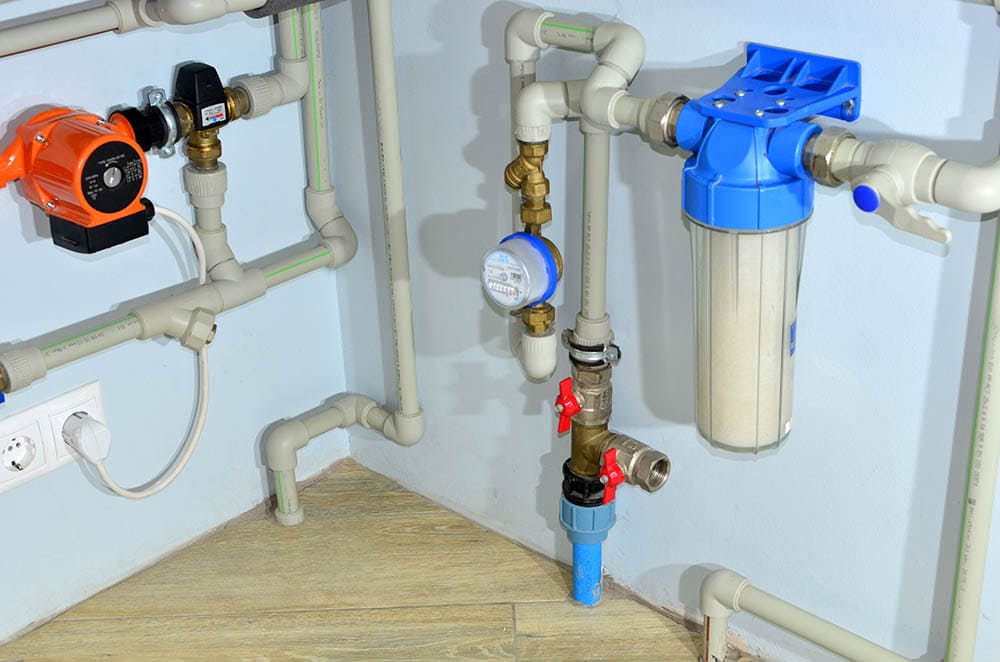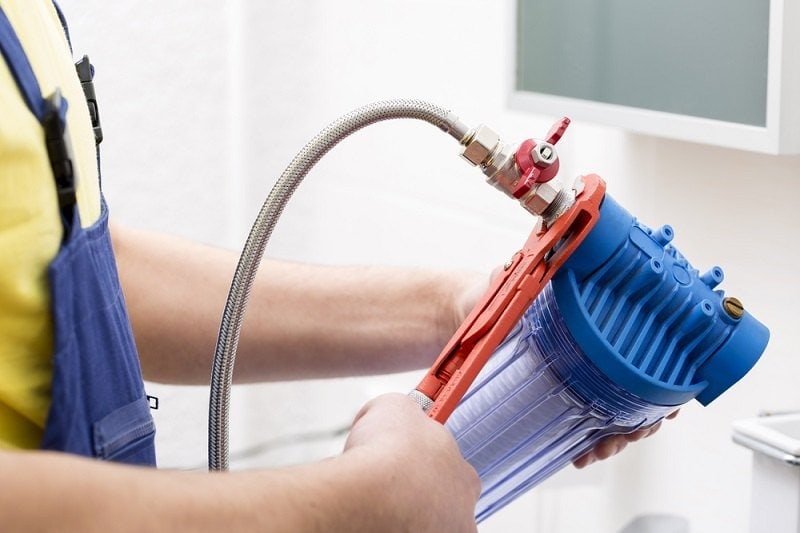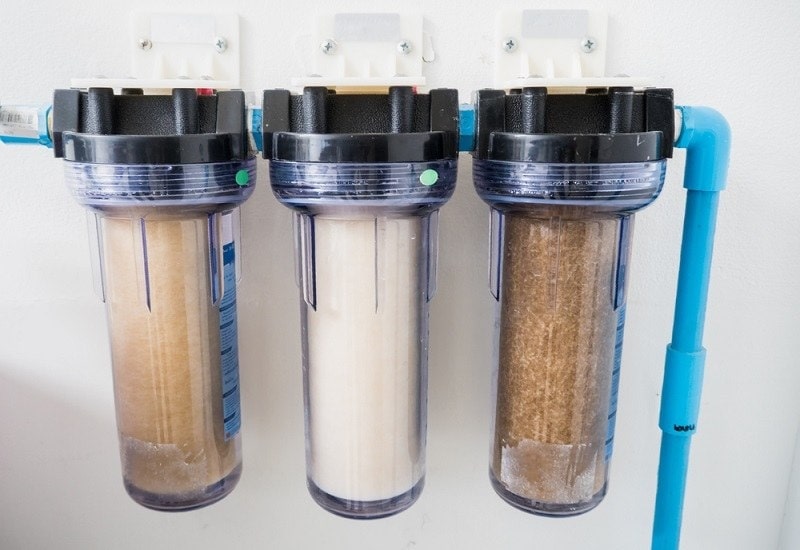How Often Should You Change a Whole-House Water Filter?
-
Pete Ortiz
- Last updated:

A whole-house water filter is a perfect solution for common concerns over water quality. In a 2022 EWG survey, over 51% of respondents felt their water wasn’t safe for drinking, primarily due to uncertainty over regulations. With a whole-house filter, you take control of the quality, so you can be sure that only the healthiest, cleanest water flows from the tap.
The peace of mind can be invaluable, but taking responsibility for your water means staying on top of maintenance. A whole-house water filter needs changing every 2–12 months. On-time filter swaps are critical to maintaining high-quality drinking water. There’s a lot to consider, so we’ll try to make it easy by explaining how often you should change a whole-house water filter.
 How Often Should You Change a Whole-House Water Filter?
How Often Should You Change a Whole-House Water Filter?
Whole-house water filters generally need replacement every 2–12 months. The filter type and size, water quality, and household water usage can all impact the filter’s lifespan.
For example, municipal water is usually more contaminant-free than well water. If you live in an urban or suburban community, you’ll likely need less filtration and fewer filter swaps. Larger households, meanwhile, will generally run a higher daily volume of water through their filters. As they expose the filters to more contaminants, they’ll need more frequent changes.
When to Change Whole-House Water Filters

Check the instruction manual and filter housing for information on the changing schedule. The manufacturer will detail the filter life and replacement directions. Your usage habits and water quality will also affect the filter, and you may need to tweak the routine over time.
If you have trouble finding the instructions, you can call the manufacturer with questions. A plumber can also assess complex setups and help create a practical schedule for all the parts. Set up reminders in your phone calendar after arranging your routine to inform you of upcoming filter changes.
Reduced water pressure and changes in water quality, odor, and taste will warrant investigation. A faulty or dirty filtration array won’t work as effectively as a well-maintained system. If you have to change filters prematurely, you may have a deeper issue with the lines or other filter parts that need repair.
Types of Whole-House Water Filters
Whole-house water filters are often multi-stage systems using different technologies to remove contaminants. Depending on your water quality, you can use various filter combinations to address certain needs.
- Sediment pre-filter (3–6 months): Removes large particles from well water, including dirt and rust
- Carbon filters (12–18 months): Adsorbs impurities, such as chlorine, VOCs, heavy metals, and pesticides
- UV filter lamps (6–12 months): UV light disinfects water, killing viruses, bacteria, and other hazardous microbes
- Reverse osmosis filters (6–24 months): RO membrane removes finely dissolved solids down to 0.0001 microns
- Sub-micron post-filter (6–12 months): Removes microbes and particles as small as 0.1 microns
Filters can be separate, or you may consider a heavy-duty filtration tank. These tanks use several media layers and typically filter 500,000 to 1 million gallons of water over their lifetime. Depending on the size, you’ll need to replace the tank every 5–10 years.
A sediment pre-filter and a post-filter commonly go with the primary whole-house water filter. You may also need a water softener if you experience hard water issues. A water softener removes calcium, magnesium, and other minerals in hard water by trapping them in a charged resin. Water softeners generally last 10–15 years.
How Long Does an Unused Whole-House Water Filter Last?

A whole-house water filter often doesn’t have a set expiration date if you don’t use it. Moisture exposure is what starts the countdown on its longevity. A new filter can sit in the box for years. But if you hook it up and only use it one time, you’ll need to change the filter in a few months.
Mold, bacteria, and other dangerous pathogens can accumulate to hazardous levels on an expired filter. The system’s quality may also break down over time, and you could let hazardous particulates through a faulty unit.
Why You Shouldn’t Use an Old Water Filter
Regardless of when you have to replace your whole-house water filter, doing so on time or even a bit ahead of schedule is crucial. Overworked and expired filters will be useless at removing contaminants from the water. Before it exits the tap, contaminated water could damage other filters, your water heater, and plumbing.
Beyond the damage to your water system, contaminated water can also harm appliances. Refrigerators, dishwashers, and laundry equipment rely on clean, soft water to function. You risk faster breakdowns and expensive repair bills if you use water from faulty filters.
More critical than anything are the health concerns of water contamination.
- Agricultural pesticides and fertilizers
- Sewage and animal waste
- Heavy metals from industrial activity
- Paints, sealants, and solvents
- Cryptosporidium, E. coli, and other disease-causing microbes
Tainted water can have immediate and long-term consequences. Viruses, bacteria, and other pathogens cause severe gastrointestinal issues and a host of other debilitating symptoms. Meanwhile, chemical exposure can lead to chronic conditions, including cancer.
Can You Clean Whole-House Water Filters?

Some filters, such as sediment, carbon, and pleated filters, can handle cleaning for extended use. You’ll have to shut off the water supply to the home and release the water pressure before removing the filters. Depending on the type of filter, you may use bleach or various acid cleaners to refresh them before reinstalling them. Always follow the manufacturer’s care instructions, and don’t attempt to clean the same filter forever.
 Final Thoughts
Final Thoughts
A whole-house water filter may not be necessary for everyone, but if you and your family use one, proper upkeep is vital. You can maintain an appropriate filter change schedule and check your water for quality issues to keep your household safe. A proactive approach to your whole-house filtration will ensure successful upkeep with minimal hassle.
Featured Image Credit: Maksim Safaniuk, Shutterstock
Contents

 How Often Should You Change a Whole-House Water Filter?
How Often Should You Change a Whole-House Water Filter?